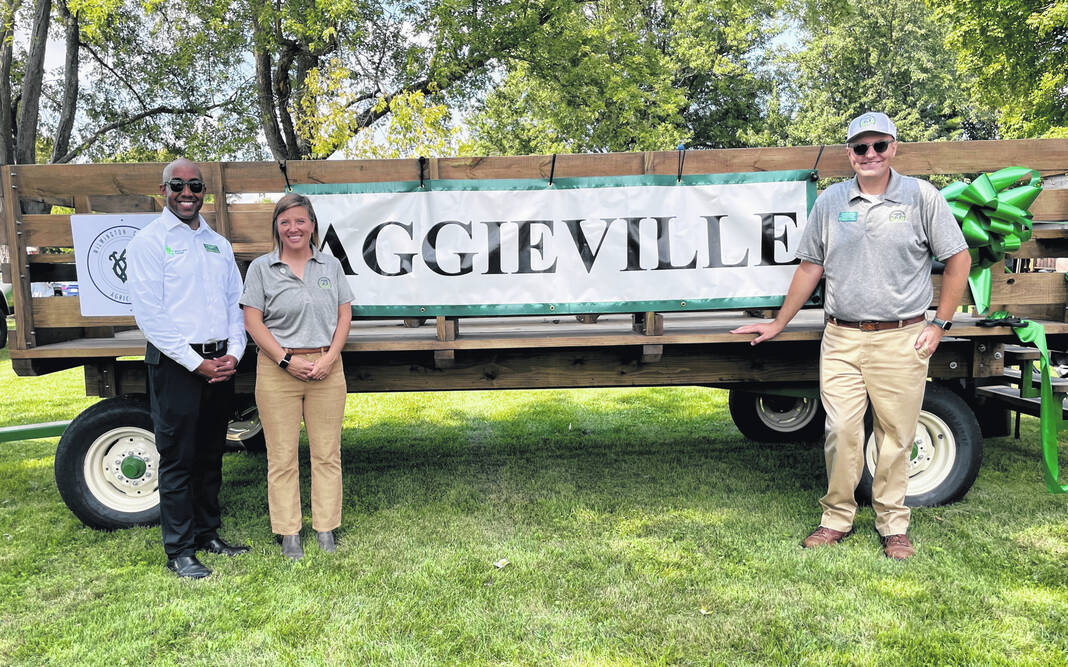
WILMINGTON — Wilmington College’s observance of the agriculture program’s 75th anniversary year offers a unique perspective as it embarks upon a new era of preparing students for careers involved with feeding a rapidly changing and ever-hungrier world.
Agriculture is one of the college’s greatest, hands-on learning success stories as the academic area founded in 1948 boasts 300 students this fall including a cohort of 115 new students who comprise a third of the institution’s entering class this semester. A record 74 percent of ag students are female, which represents the large sweep of the industry beyond the traditional perception involving working the land with cows, sows and plows.
The department hosted its annual Aggieville gathering with an impressive turnout of alumni and students during homecoming festivities Sept. 17. There, college officials offered program updates featuring announcements of a corporate partnership, new farm equipment, an endowed chair, the prospect of another new concentration and the gift of an unusual artifact.
Dr. Chad McKay, area coordinator for agriculture and an associate professor, said Aggieville was a continuation of the program’s Diamond Jubilee held earlier in the summer. “We had a phenomenal turnout of alumni in June and wanted to continue the celebration by getting more current students involved so we planned Aggieville on a grander scale,” he said. “It’s the students’ program and we want them to understand the scope of its impact by celebrating where it’s been, where we are today and where we’re going.”
The college received a $1 million gift from the family of a deceased agriculture alumnus. It was made in his memory while the donors, who wish to be unnamed, recognize the important impact the college had on his life. The gift is funding the Endowed Chair in Agriculture. It represents the college’s second such endowment, which pays the salary of the chair-holder from the gift’s investment earnings.
McKay has been designated for the chair, which frees up funds for hiring a new faculty member in agribusiness next fall. That professor will have expertise in agricultural marketing and sales to complement McKay’s forte in ag finance, economics and management.
“This endowed chair is a true testament to the support the ag department has received for 75 years,” McKay said. “It’s a humbling experience for me, but it represents support for the entire department and our students.”
In other news, the college entered into an agreement with Bane-Welker Equipment in Wilmington in which the local implement dealer is donating the use of a combine and planter in the fall and spring, respectively, so students have access to the most modern equipment. McKay noted that a Bane-Welker salesman, 2020 WC graduate Mark Stewart, played a key role in the company offering the gift for which the college only pays insurance costs.
“We want to teach using the most modern technology and Bane-Welker generously wanted to help,” McKay added.
Also, the college purchased what they call the “Aggiewagon,” a wagon which, when pulled by a tractor, will accommodate hands-on learning by taking classes through WC’s fields. It also will be used at ag-recruitment events for farm tours.
Jerry Goodbar, an agriculture alumnus from the class of 1967, unveiled at Aggieville a unique rock shaped like the state of Ohio. It was dedicated to the memory of agriculture program founder Roy Joe and Ruth E. Stuckey and will be showcased in the Center for the Sciences and Agriculture.
The area expects to add a new major concentration next fall in Agricultural Leadership, which McKay noted is an area that many ag students pursue as a graduate degree. This fall, the proposal is going through the academic approval process. Concurrently, the Agricultural Communications concentration is being rebranded by pairing it with leadership.
Also, the program this fall is hosting a new concentration known as Resource Conservation and Regenerative Agriculture. McKay noted it shows students how to farm both “efficiently and environmentally” by reducing the footprint left behind and leaving the land in good shape for the next generation of farmers. It also accommodates the boom in jobs available in the soil and water conservation areas.
WC currently also offers concentrations in agribusiness, ag communications, agronomy, animal science and, in conjunction with the education department, a career-technical teaching license in agriscience, as well as equine business management and minors in equine studies and agriculture.


